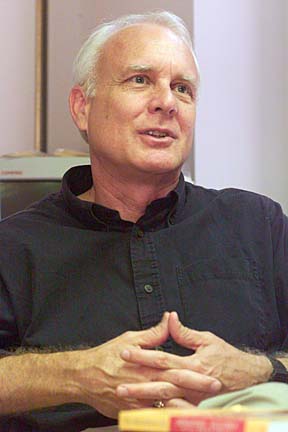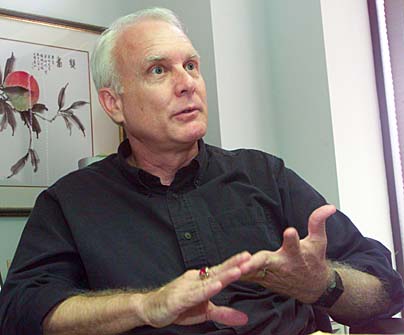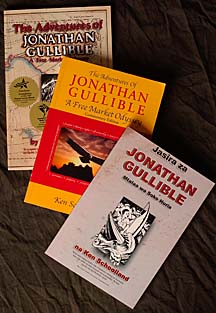

|
First Sunday Mark Coleman |
Ken Schoolland's clever book explaining a complex subject -- free market societies -- is a hit around the world. It has been translated into more than 35 languages.
Found in translation
Just sit right back and you'll hear a tale, a tale of a fateful trip ..."
Oh, wait, sorry, wrong castaway story. That's "Gilligan's Island."
The focus of my recent conversation with Waikele resident Ken Schoolland was his "The Adventures of Jonathan Gullible," an amazingly popular tale of a young man who -- surprise -- goes sailing in his little boat, gets caught in a storm and winds up stranded on a lush tropical isle.
But this island isn't deserted. People live there, and their odd customs and beliefs provide the backdrop for Gullible -- and readers of his "free market odyssey" -- to learn about economics, politics and philosophy.
First published in 1989 by Small Business Hawaii, Schoolland's book, with illustrations by Randall Lavarius, has been translated into more than 35 languages, its reach extending through Europe, Africa, the Middle East, the Pacific and Asia.
It has gone through several editions, growing in heft and influence each time. Hundreds of people worldwide have been involved in adopting Schoolland's book for their own countries or cultures, not only in book form but also for radio, television, video, DVD, stage, comics, songs and now the Internet.
Schoolland's credentials to write such a book include a master's degree in foreign service from Georgetown University, working as an international economist for the White House and the U.S. Commerce Department and teaching at colleges in Alaska, Japan and Hawaii. An earlier book, 1990's "Shogun's Ghost," was an expose of "the dark side of Japanese education."
Schoolland is an associate professor of economics and political science at Hawaii Pacific University, where he has won two awards for teaching excellence and serves as faculty adviser to the school's Students in Free Enterprise club.
"There's plenty of land. ... If all the refugees in the world came to Hawaii, we would have about a third of the population density of Hong Kong." --Ken Schoolland, Associate professor of economics and political science at Hawaii Pacific University and author of "The Adventures of Jonathan Gullible"
Translations galore
Mark Coleman: Your book "The Adventures of Jonathan Gullible" is now being read all over the world, in dozens of languages. Are you aware of any author locally whose books have been translated into more languages?Ken Schoolland: I don't know of any. That's not to say there aren't some.
MC: How many languages is this book into now?
KS: Languages, probably 37, 38, but actually published, it's 30 now, with the Urdu edition just coming out.
MC: The what?
KS: Urdu, throughout Pakistan. It's the Muslim community through southern Asia. I haven't received a copy of that yet, but just prior to that was the Kiswahili edition. Then, just last month, we came out with the U.K. commentary edition. It's in English, but now it's more than twice the size of the original, because each chapter has a commentary, background, references.
Janette Eldridge, a computer teacher in South Africa, did the first draft, and then we passed it back and forth over a couple years. It's intended for the 54 Commonwealth nations. There are no illustrations. The idea is to appeal to adults who don't have an extensive academic background -- they're busy with their own lives, but they're interested in free market ideas and how they relate to contemporary issues.
MC: Who was the original edition of "Jonathan Gullible" aimed at?
KS: I wanted to be able to use it in my classrooms.
Riding the radio waves
MC: Didn't this book start out as a radio show?
KS: That's right, back in the '80s on KHVH. I was asked to do some radio commentaries on a weekly basis, which were 90-second radio spots, so I had to be real concise. I did research and tried to relate it to local, national and international issues. But no one responded to the straight commentaries. So then I thought, gee, I had just read "Gulliver's Travels" (by Jonathan Swift, 1667-1745) and "The Little Prince" (by Antoine de Saint Exupéry, 1900-1944) and I thought, "Why does this stuff (the commentaries) have to be dry and boring? Why couldn't it be kind of fun?" So I started writing in that style, and the station had no objection to it. My girlfriend at the time did the dialogue with me, and instantly the response picked up. People liked it. It was fun. They could apply it in their own way to the local issues, just the way satire has always worked. I didn't have to bat them over the head with it.
The remarkable thing about this is that it pointed out to me how this can be effective in getting around a lot of barriers. That's why it's now being prepared in Farsi, in Iran, right now -- it's been approved by the mullahs there. Iran is one of the most repressed economies in the world, but this book about the free market economy is being published there. We had the same thing with Kiswahili. It was a very, very repressed government in times past. You look at all these various editions, many of them are seeking a way to get around the usual obstacles.
MC: Who's initiating these translated editions?
KS: We get responses virtually every day from people around the world saying, please, can you develop it so that we can use it in the classroom or public forums?
MC: How are these translations paid for?
KS: Probably half of our publications have been paid for by the publishers themselves, because they are expecting to sell them and earn money. About half of them have been sponsored through ISIL (the International Society for Individual Liberty), a network of people trying to promote free market ideas by translating published works and so on. To tell you the truth, this is their most successful project because it's small and an easy introduction for a lot of people, plus it's fun.
A small business project
MC: When did you first put "Jonathan Gullible" into book form?KS: I think it was 1989.
MC: What's the involvement of Small Business Hawaii in this whole thing?
KS: Oh, yeah. That's something I must not overlook. Sam Slom (president of SBH) has been the driving force, really from the beginning. I wrote these radio commentaries, but it was Sam who said, "You should do this as an educational publication for Small Business Hawaii." So we put out the first book, and it was so successful. It won two awards and started breaking into a half-dozen Eastern European countries. It also was being used in seven private high schools here. So he said, "Well, let's do another edition." So we did. We went from 47 pages to 87 pages, and then that edition was published in 20 countries altogether. So then he said, "Well, let's do another edition." (Laughter) The latest one is now 260 pages.
So Small Business Hawaii is really very much responsible for this coming into 23 languages before this edition, and I think it's taking off because just in the last two years we've had about 10 new languages added to it. It's also won more awards, (Noble laureate economist) Milton Friedman has endorsed it, and more interesting, I think, it's been picked up by almost 20 public policy institutes around the world -- adopted and used or promoted by those organizations.
Working the Web
MC: It must be nice to think of all the people you've been influencing. That's pretty incredible.KS: I think so. I think there's probably a hundred thousand copies of this circulating in one form or another in places all around the world where they've never had a chance to talk about free market stuff. Now we're trying to develop electronic media, but in the meantime, scripts are available online (www.jonathangullible.com). Anyone who wants to use the radio scripts for language training or whatever can download it and broadcast it.
MC: Who runs your Web site?
KS: Ginger Warbis. She's in Pennsylvania. We've corresponded, but I've never met her personally. That's how the Internet stuff is. She was first sponsored by Susan Wells, a screenwriter from Florida who put up the initial money for Ginger to develop a Web site. Since then there's been a Jonathan Gullible fund at the ISIL that attracts donations throughout the year, and they pay for the continuation of the Web site.
MC: Has the book been used in the public schools locally at all?
KS: The Department of Education was presented the book and they never got back. No response. So maybe there is no interest in free markets yet at the DOE. The irony is that people everywhere else in the world seem to be interested.
MC: Well, is it that they're not interested in free markets or is it more that they don't consider it an appropriate vehicle to teach economic principles?
KS: I don't know. It's a little story, but they have classics like "Animal Farm" (by George Orwell, 1903-1950) as part of their reading programs.
The power of parables
MC: Why did you name your main character Jonathan Gullible, because as a practical matter, he isn't really gullible.KS: No, that's right. I just wanted something to give that sense of "Gulliver's Travels." I was also influenced by "The Little Prince." I was very impressed with how very profound statements about life could be made in a very simple way, and the "The Little Prince" does that beautifully.
MC: One of the first political books I ever read was Ayn Rand's (1905-1982) "Anthem," which also is a parable.
KS: Yes, exactly. That's one of the first political books I ever read, too. My wife, Li, grew up in China during the Cultural Revolution, and after she read it she said, "That's exactly the way it was (in China during the days of communist dictator Mao Zedong)." Another writer who was masterful in using stories to make points was Frederic Bastiat (1801-1850). He's famous among economists for his story of the broken window, about that which is seen and unseen. Henry Hazlitt (1894-1993) picked up on that and wrote about it in straight commentary in his "Economics in One Lesson." In fact, I had just read Hazlitt's book when I started writing the radio commentaries, so I also picked up on Bastiat's illustrations the same way Hazlitt did.
Mixing it together
MC: How much time does your work on "Jonathan Gullible" take in relation to your regular job?KS: My wife tells me too much time. But I mix it together. I mean, it's part of my job, to be involved with scholarship. Some people only think of it as scholarship if it gets into a journal, but I do that, too, and the articles have been well received. I also give speeches about it. That's why I did a whole tour of South Africa and Kenya last month (in April), and then this month (May) in Las Vegas.
MC: Then next weekend you're leaving for Kansas City. What's that about?
KS: Students in Free Enterprise. I'm the faculty adviser for the club at Hawaii Pacific University. They compete nationally. They start up businesses, they consult with businesses. It's a practical, hands-on group.
MC: What do they do in the competition?
KS: They make a half-hour presentation to the judges about their activities during the year. The judges often are CEOs from major corporations. They often hire these students on the spot. That's why it's very rewarding for these students, not only in getting experience in business but also in very good job offers.
Treasures of the earth
MC: What else interests you at this time?KS: Most of my speeches now are on the topic of immigration. I'd be happy to send you some of my papers.
MC: Well, what's your point?
KS: I argue for immigration. For example, my most recent submission to the Journal of Private Enterprise is about the argument that welfare is a magnet for immigrants. So I say, well, if it's true that welfare is a magnet for people to move, then people who are here in the country, where there are no obstacles to going from one state to another, would move to the states with the most welfare, but my research shows exactly the opposite. The states with the most welfare have the most out-migration, both of the native-born and foreign-born populations, and the 10 states with the least welfare have overwhelmingly the most in-migration, both of the native-born and foreign-born populations.
So I think this is a fear. Lazy people don't leave everything that's familiar to them to run to someplace where they can just get welfare. No. It is the courageous people who leave everything that's familiar to them to go to a place that's unfamiliar and potentially hostile, and take all the risks. They also are the most entrepreneurial, they're the most likely to start businesses, and they're the most likely to study science and propel their kids to achieve. They are the treasures of the Earth, and they should be valued as such.
MC: What about the population-pressure argument?
KS: Well, in the state of California, the population has been declining, but in the metropolitan area of Los Angeles, the population has been increasing. So there's actually more space for people to move onto and there's more high population for people who want it. It turns out, actually, many people move to cities. They go there because that's where the action is. That's where the jobs are. But there's no shortage of space. If you look at it, about 3 percent of the land area in the contiguous 48 states is where the cities are, and there's plenty of space everywhere else. You fly over the United States and you wind up looking for hours and hours and hours at virtually uninhabited land.
Even in Hawaii, all the commercial and residential area is zoned to just about 5 percent of the land area -- less, actually. So there's plenty of land. I even did some calculations on what would happen if all the refugees in the world came to Hawaii: We would still have about a third of the population density of Hong Kong. And it doesn't mean poverty for Hong Kong. It's one of the wealthiest countries in the world. They are wealthier per capita in Hong Kong than in the United Kingdom. That's because they have freedom. If you have freedom, then people are considered treasures. It's only where you have lack of freedom where people become a burden.
See the Columnists section for some past articles.
Mark Coleman's conversations with people who have had an impact on our community appear on the first Sunday of every month. If you have a comment or suggestion, please send it to mcoleman@starbulletin.com.


